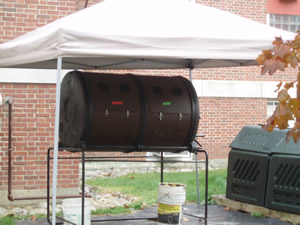Home → Waste Management → Programs → Residuals, Sludge and Composting
Residuals, Sludge and Composting
Program Tasks: The Utilization program staff are responsible for:
- Licensing
- Compliance Inspections
- Technical Assistance
- Education and Outreach
- Enforcement
Introduction

Program Area: The Utilization program staff oversee:
- Land application of sewage sludge, fish by-products, food waste, secondary papermill sludge or other residuals to supply nitrogen (N), phosphorus (P), potassium (K), or other nutrients to a crop;
- Land application of bioash, lime-mud, cement kiln dust or other residuals as agriculture liming agents;
- Land application of primary papermill sludge, flume grit, wood wastes or other high carbon residuals as a topsoil replacement, or to beneficially increase soil organic matter content;
- Utilization of composted residuals, or other processed residuals as a fertilizer, soil amendment, or topsoil replacement;
- Land application of septage;
- Facilities that compost, aerobically digest, anaerobically digest, air dry, heat dry, heat treat, lime stabilize, pelletize or otherwise process residuals, to make the residual suitable for land application.
Contacts
| Regional Office | Staff | Phone | |
|---|---|---|---|
| Augusta | Jim Pollock | 207-592-8343 | Jim.C.Pollock@maine.gov |
| Augusta | Sarah Smith | 207-881-7936 | Sarah.Smith@maine.gov |
| Augusta | Stephen Morin | 207-252-1841 | Stephen.Morin@maine.gov |
| Bangor | John Breedlove | 207-530-6601 | John.Breedlove@maine.gov |
| Bangor | Edward Stamborski | 207-881-7935 | Edward.Stamborski@maine.gov |
| Portland | Daniel Chea | 207-855-8129 | Daniel.Chea@maine.gov |
| Presque Isle | Margaret Watson-Pierce | 207-242-0383 | Margaret.Watson-Pierce@maine.gov |
Laws
Title 38, Chapter 13: WASTE MANAGEMENT
Rules
These electronic files contain the Department of Environmental Protection's rules as they were filed with the Secretary of State's Office. These are not certified copies of the regulations. In order to rely on the provisions in a rule as an official version of the State law, you must obtain a certified electronic copy of these rules directly from the Secretary of State's Office.
For further information contact Margaret Watson-Pierce (207) 242-0383
- Ch. 400 (Word) Solid Waste Management Rules: General Provisions
- Ch. 405 (Word) Solid Waste Management Rules: Solid Waste Management Rules: Water Quality Monitoring, Leachate Monitoring, and Waste Characterization
- Ch. 409 (Word) Solid Waste Management Rules: Processing Facilities
- Ch. 410 (Word) Solid Waste Management Rules: Composting Facilities
- Ch. 418 (Word) Solid Waste Management Rules: Beneficial Use of Solid Wastes
- Ch. 419 (Word) Solid Waste Management Rules: Agronomic Utilization of Residuals
- Ch. 420 (Word) Septage Management Rules
Forms
Additional Information
Licensing Fee Schedule (PDF)
Processing Time Schedule (PDF)
L.D. 1911 - Sludge and Sludge-Derived Compost Ban and Septage Prohibition
Reports, Active Compost Facilities
- Anaerobic Digestion Facilities (PDF)
- Sludge Composting Facilities (PDF)
- Fish or Food Waste Composting Facilities (PDF)
- Yard Waste Composting Facilities (PDF)
Related Programs
DEP Wastewater Discharge Program - Bureau of Land & Water Quality. The Wastewater Discharge Law requires that a license be obtained for discharge of pollutants to a lake, river, stream or coastal waters.
Septic Systems. The Maine Center for Disease Control and Prevention, Division of Environmental Health, regulates subsurface sewage disposal systems (“septic systems”), licensing of persons to evaluate soils for subsurface wastewater disposal systems, and inspection of plumbing and subsurface waste water disposal systems.
Maine Compost School - A cooperative effort by the Maine Department of Agriculture, Conservation and Forestry, and the University of Maine Cooperative Extension providing training in the art and science of composting through classroom instruction, laboratory experience, and hands-on project exercises. (Off Site)
U.S. EPA Biosolids (Off Site)
